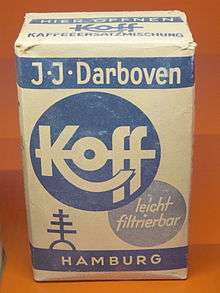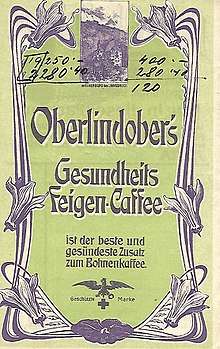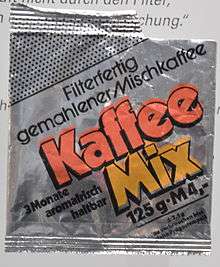Coffee substitute
Coffee substitutes are non-coffee products, usually without caffeine, that are used to imitate coffee. Coffee substitutes can be used for medical, economic and religious reasons, or simply because coffee is not readily available. Roasted grain beverages are common substitutes for coffee.


In World War II, acorns were used to make coffee, as were roasted chicory and grain. During the American Civil War coffee was also scarce in the South:[1]
For the stimulating property to which both tea and coffee owe their chief value, there is unfortunately no substitute; the best we can do is to dilute the little stocks which still remain, and cheat the palate, if we cannot deceive the nerves.
— "Substitutes for Coffee", The Southern Banner, 1865
Coffee substitutes are sometimes used in preparing foods served to children or to people who avoid caffeine, or in the belief that they are healthier than coffee. For religious reasons, members of churches such as the Church of Jesus Christ of Latter-day Saints (LDS Church), and the Seventh-day Adventist Church, refrain from drinking coffee,[2] but not all hot drinks;[3] some may drink a substitute.[4]
Some Asian culinary traditions include beverages made from roasted grain instead of roasted coffee beans (including barley tea, corn tea, and brown rice tea); these do not substitute for coffee but fill a similar niche as a hot aromatic drink (optionally sweetened).
Ingredients
Grain coffee and other substitutes can be made by roasting or decocting various organic substances.
Some ingredients used include almond, acorn, asparagus, malted barley, beechnut, beetroot, carrot, chicory root, corn, soybeans, cottonseed, dandelion root (see dandelion coffee), fig, roasted garbanzo beans,[5] lupinus, boiled-down molasses, okra seed, pea, persimmon seed, potato peel,[6] rye, sassafras pits, sweet potato, wheat bran.
History
The Native American people of what is now the Southeastern United States brewed a ceremonial drink containing caffeine, "asi", or the "black drink", from the roasted leaves and stems of Ilex vomitoria (Yaupon holly).[7] European colonists adopted this beverage as a coffee-substitute, which they called "cassina".[8]
In Quebec, the seeds of the black locust were historically used as a coffee substitute, before the stem borer decimated populations of the tree.
A coffee substitute from ground, roasted chickpeas was mentioned by a German writer in 1793.[5]
Dandelion coffee is attested as early as the 1830s in North America.[9]
The drink brewed from ground, roasted chicory root has no caffeine, but is dark and tastes much like coffee. It was used as a medicinal tea before coffee was introduced to Europe. Use of chicory as a coffee substitute became widespread in France early in the 19th century due to coffee shortages resulting from the Continental Blockade. It was used during the American Civil War in Louisiana, and remains popular in New Orleans.[10] Chicory mixed with coffee is also popular in South India, and is known as Indian filter coffee.
Postum is an instant type of coffee substitute made from roasted wheat bran, wheat and molasses. It reached its height of popularity in the United States during World War II when coffee was sharply rationed.
Examples

- Barleycup is a similar product sold in the UK.
- Nestlé Caro is made of roasted barley, malted barley, chicory, and rye and is used as a coffee substitute.[11]
- Inka is a Polish drink made of rye, barley, chicory, and sugar beet, produced since 1971.
- Molecular coffee, made from plant-based materials and caffeine, was made public in 2019 after being developed by the Seattle-based company, Atomo.[12][13]
- Similar products that contain coffee
- Camp Coffee is a mix of chicory and coffee from the UK, sold since 1876.
- Ricoré is a mix of chicory and coffee from France created in 1953, now produced by Nestlé.
- Historical "coffee mixes" produced during shortages that contain a majority percentage of real coffee (see image)
Preparation
Coffee substitutes may be powder, which dissolves in hot water; grounds, which are brewed like coffee; or grains, left whole to be boiled and steeped like tea.
See also
- Brewing (disambiguation)
- East German coffee crisis
- Ersatz good
- Herbal tea
- List of hot beverages
References
- "Substitutes for Coffee". The Southern Banner. Athens, Georgia. March 15, 1865. p. 1 col. 4 – via Confederate Coffee Substitutes: Articles from Civil War Newspapers.
- Mormon scripture: Doctrine and Covenants section 89, 1–9; written in 1833
- The LDS Church interprets "hot drinks" to mean coffee and tea.
- In the same section of scripture, an alternative for coffee is offered
- "Introduction: Chickpeas". International Center for Agricultural Research in the Dry Areas. Archived from the original on 18 July 2012. Retrieved 28 August 2008.
- Potato Coffee Archived 2007-09-28 at the Wayback Machine
- Crown, Patricia L.; Emerson, Thomas E.; Gu, Jiyan; Hurst, W. Jeffrey; Pauketat, Timothy R.; Ward, Timothy (2012-08-28). "Ritual Black Drink consumption at Cahokia". Proceedings of the National Academy of Sciences. 109 (35): 13944–13949. doi:10.1073/pnas.1208404109. ISSN 0027-8424. PMC 3435207. PMID 22869743.
- The Tea & Coffee Trade Journal. Tea and Coffee Trade Journal Company. July 1922. p. 53.
- Moodie, Susanna (2007-12-04). Roughing it in the bush. McClelland and Stewart. p. 385. ISBN 9780771034923. Retrieved 7 July 2011.
- Smith, Anabelle K. (March 5, 2014). "The History of the Chicory Coffee Mix That New Orleans Made Its Own". The Smithsonian Magazine – via Smithsonian.com.
- "Caro Malzkaffee". Archived from the original on 2006-11-05. Retrieved 2006-11-05.
- Goodbye Beans, Hello Molecular Coffee
- This “Molecular Coffee” is Brewed Entirely Without Beans
